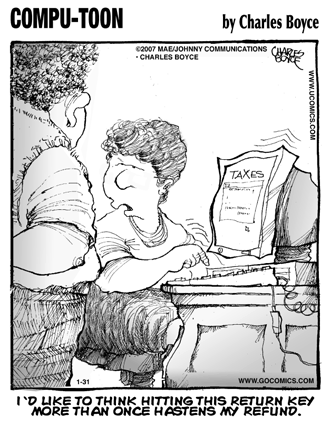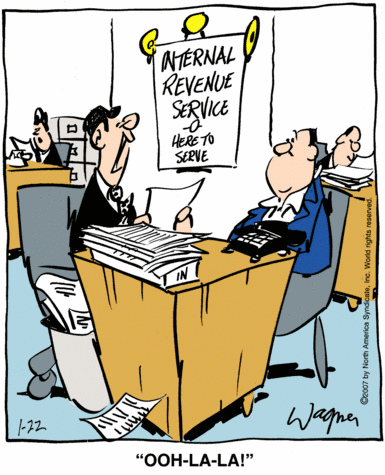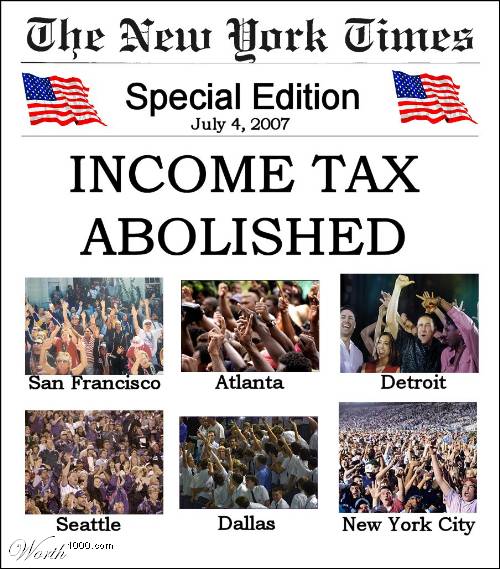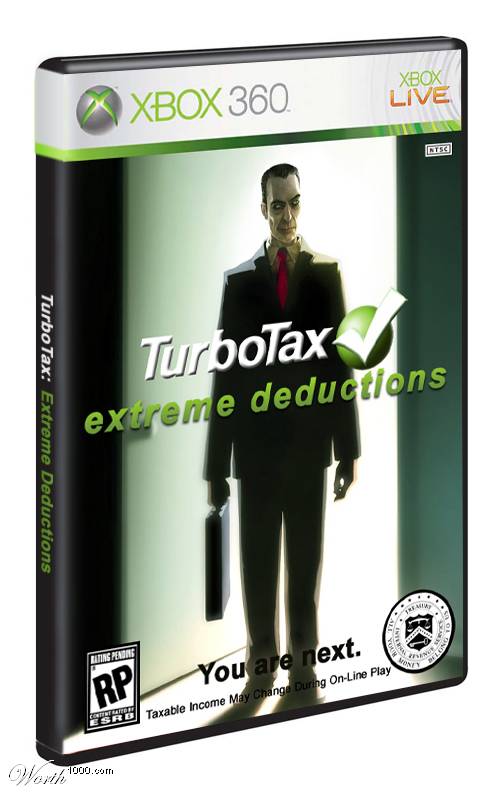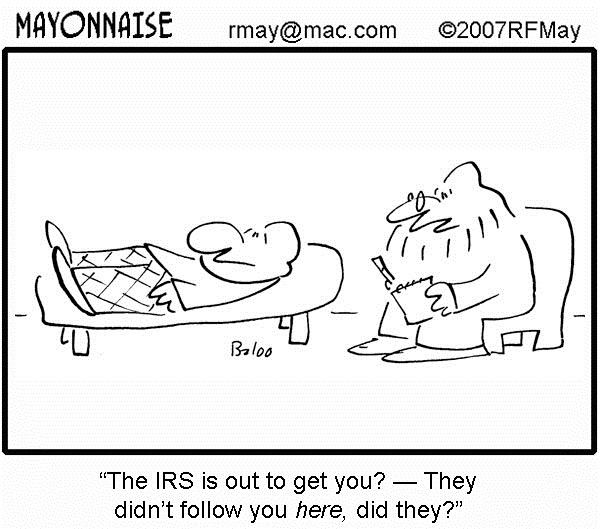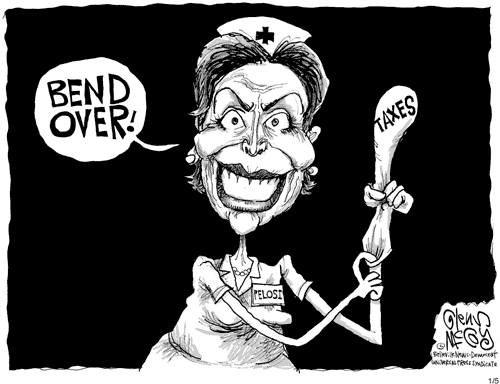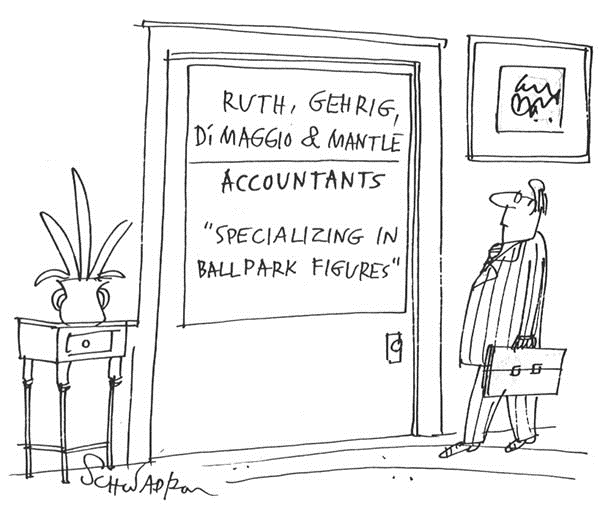Employee Expense Reimbursements
Q:
Subject: 1099-MISCHi Kerry,My daughter is a salaried employee. During the past year she received reimbursement for work-related travel expenses via an allowed mileage rate. She just received a 1099-MISC reporting the total of the reimbursed amounts as if it were compensation. The amount is too small to be deducted as an employee expense. My tax software wants to treat this as taxable income which hardly seems fair or appropriate. What should she do? Thanks.I forgot to mention that the amounts are being reported under Block 7, Non-employee expenses.
A:
She needs to list all of her personally incurred out of pocket business related expenses, including appropriate miles on her car on Form 2106. The reimbursements received should be reported on Line 7 in the appropriate columns. As the Step 3 portion of the 2106 will show, if she received more in reimbursements than her expenses were, the excess amount only will have to be shown as income on Line 7 of her 1040. If her net expenses were higher than the reimbursements, that excess will be entered on Schedule A.
If she doesn't have enough deductions to itemize and uses the standard deduction, she should still include the 2106 and Schedule A with her 1040 just to show IRS that the amount from the 1099-MISC has been reported in the proper place (Line 7 of the 2106). If these schedules aren't included with the 1040, IRS could very easily mistake the 1099-MISC amount as unreported income and send your daughter a bill for taxes on that in a few years' time, plus interest and penalties. I have seen that happen on several occasions.
Your daughter should really be working with a professional tax advisor to make sure she is claiming all of the out of pocket business expenses to which she is entitled.
I hope this helps.
Kerry Kerstetter
Timing of Income Recognition
Q:
Subject: Income recognition problemHi Kerry,I love your blog, esp. the cartoons, and I had a question for you. I runa website where I earn affiliate income and I use the cash accountingmethod (where you recognize income when it's paid, not when the work isperformed) with my sole proprietorship. My problem is that the programwill recognize monies paid out on Dec. 31st via check as part of myearnings in 2006 on the 1099 and I didn't know if I had to as well andwhether that discrepancy would be a problem.Thanks,
A:
I'm assuming that you're referring to how to handle a check to you that was printed on 12/31/06, but not actually received by you until sometime in early January 2007.
By not having constructive or actual receipt of the money, you are correct that you do not have to pay tax on it on your 2006 income tax return, even if the payor has reported it to IRS as 2006 income. The way I have long handled this very common situation is to include the full 1099 amount on the Schedule C line for gross revenues and then on a line below that, enter a negative amount for the check not received until 2007, with a description of what happened. This way, the IRS computer will match the 1099 amount and the actual amount of income you are paying tax on will be accurate.
You then need to be sure to make the same kind of adjustment in the opposite direction on your 2007 Schedule C. You need to add the January 2007 payment received to the 2007 1099 amount.
You really should be addressing issues such as this with your own personal professional tax advisor. If you don't have one, you should know how I feel about that if you have been reading my blog for any length of time.
Good luck. I hope this helps.
Kerry Kerstetter
Follow-up:
Hi Kerry,
Thank you so very much for the response and you understood my poorly explained question perfectly! And yes, after reading your blog for several months, I do know your stance on hiring a professional and I have considered it - I just haven't gotten all my docs together so I have been putting it off.Thanks again and if you ever have blog related questions, feel free to shoot me an email :)
Some 1099 forms will arrive late – And most likely with errors. This is just one of the many reasons why it’s not a good idea to try to rush a tax return out too quickly. Be sure to take plenty of time to make sure everything is as accurate as possible.
SUV Shopping By Weight
Q-1:
Subject: Corp. tax deductionHello Kerry,Is this vehicle rated ok for a one time full purchase price tax deduction for our corporation?ModelTK10906 -2007 YUKON XL DENALI -AWDGross Vehicle Weight Rating3360 kg (7409 lb)Purchase price of 2007 Yukon XL is approx. $55,900.00.Thanks for your help,
A-1:
Since the Denali is an SUV, its first year Section 179 deduction is limited to $25,000. If it were a pickup truck, the maximum would be $108,000.
The rest of the cost over the first $25,000 would be depreciated over five years.
On a related note, I checked on the info that the local Chevy dealer was passing on in their ads. They weren't saying that the tax law changed as of 12/31/06. They were only pointing out the obvious fact that calendar year taxpayers had to buy a new vehicle by 12/31/06 in order to claim it on their 2006 tax returns. Since your corp tax year doesn't end until later, your deadline is later than those who use December 31 for their tax year.
I hope this helps.
Kerry
Q-2:
Hello Kerry,
Is a Chevrolet Avalanche Truck ok as a one time full purchase price tax deduction for our corporation?
Is an open bed truck the only kind of a vehicle that is ok for an one time full purchase price tax deduction?
Thanks for your help,
A-2:
The rules for which vehicles weighing more than 6,000 pounds are subject to the $25,000 Section 179 limit are on my blog here.
“To not be subject to the limit:
I) is designed to have a seating capacity of more than 9 persons behind the driver's seat,
`(II) is equipped with a cargo area of at least 6 feet in interior length which is an open area or is designed for use as an open area but is enclosed by a cap and is not readily accessible directly from the passenger compartment, or
`(III) has an integral enclosure, fully enclosing the driver compartment and load carrying device, does not have seating rearward of the driver's seat, and has no body section protruding more than 30 inches ahead of the leading edge of the windshield.'.”
With the Avalanche, it would need to weight over 6,000 pounds and have an open bed at least 6 feet long.
This sounds similar to a discussion we had last year about a Denali, which I actually posted on my blog.
Good luck.
Kerry
Labels: 179
Posting Stocks in QuickBooks
Q:
Subject: Stocks
A:
Most non-accountants are confused as to the proper way of handling reinvested dividends; so I thought your question was perfect for educating others.
If you are referring to the market value of the shares, you are correct that the stockbroker's statement will not match the figures in your QB because QB is strictly a record of your cost basis, or what you have invested into the shares.
However, the dividend income reported by the stockbroker for the previous year should match what you have in your QB and is the most important way we have of double-checking the accuracy of the QB data.
Kerry
Follow-Up:
Kerry,My dad just had his 88th birthday. He is a retired accountant so I thought you might enjoy seeing his reply.He is much better on the computer than I am. He teaches classes at the senior center!
Thanks for sending Kerry's reply. I am impressed with him and his explanation.Your QB is more detailed and accurate, as he said.Over the years I have become accustomed to the automatic steps taken byQuicken and MS Money and forgot I ever used a General and other Journals.In MS Money, my portfolio page shows in each investment the number ofshares owned, The total value as of the last entry date and the amountof gain. This is a backward way to arrive at the investment cost, butarrives at the same answer.
Labels: QB
Working With Corporations
I receive dozens of emails each week from people confused as to how to properly utilize a corporation; a very few of which I post on this blog. It was no surprise that, when I was invited to give a presentation to the Tri-Lakes Board of Realtors in Branson tonight, that this would be the topic. I rarely make live public appearances any more, but the chance to set 200 or so Realtors onto the right track was too tempting to pass up.
For those who can’t make it, I have posted the handout that I prepared for the attendees, using the TaxCoach Software templates.
I have another few pages of notes that I am assembling of major points I intend to cover. I will probably post those in the next few days, along with comments from the actual presentation.
IRS Moving to Costa Rica?
It was well publicized that the big floods in DC last Summer forced IRS to close its World HQ for several months. I wasn’t aware that some nut-jobs took that temporary vacancy in DC to signify that IRS had moved much of its top brass to Costa Rica until I saw this piece from Snopes.com debunking that.
Wrong Heirs

I have seen actual cases where this has happened; estates have been eaten away over several years by lawyer fees. This usually happens when there is a lengthy probate because a living trust wasn't used or one was handled incorrectly. The most common mistake I've seen is where a living trust is established, but no assets are ever transferred into its name, negating any ability it could have to avoid probate, which reduces more estates than the death tax does.
Poor choice of name?

This obviously applies to Realtors, as well as to stockbrokers.
Of course, the fact that those of us in the so-called white collar professions (legal, medical, accounting) are said to be "practicing" probably isn't much more reassuring to those who entrust their lives (legal, financial and actual) with us.
From the latest issue of Intuit ProConnection:
How to Handle Last-Minute Deductions That Aren’t on Form 1040 – Includes sample client doc file on these extender changes.
Street Accountants
One of my favorite types of comedy has long been parody and satire. The only part of the Academy Awards shows I’ve watched over the past dozen or so years have been Billy Crystal’s movie parodies at the beginning.
I am also a big fan of British comedy, so it wasn’t a big shock to see that some folks in England have produced a hilarious and very well done six and a half minute faux expose comparing wild accounting graduates to street walkers.
I found it here on TaxGirl's blog, where she has even included a link for downloading the video to your own computer. I no longer have a waiting room for clients, as I did back on the Left Coast; but I could envision playing this on a TV for clients’ entertainment.
Divorce and Business Ownership
Q-1:
Subject: S corp, LLC and divorceKerry,What should I be on the watch for during my 1 1/2 year divorce related to S corp and LLC?My husband is a 20% minority shareholder in a family S-corp and the property that the moving business resides is an LLC that we own 33%.After 1 1/2 years, I can not seem to get my attornies nor a business valuation company to value the business or obtain income and expense data.I am in need of some advice... Attornies don't seem to want to touch it?? Should I begin an IRS investigation?Thanks,
A-1:
You do have a legal right to have your own tax and accounting experts inspect the books of any business in which you have a financial interest. This is to ensure that you receive a fair division of marital assets, as well as avoid any problems with IRS in regard to pass-through income from the S corp and LLC.
Any good divorce attorney should know this and do everything possible to see that your interests are protected. If your attorney is unaware or unable to push for such inspections, it is obviously time for you to find an attorney who is more aggressive or has fewer conflicts of interest with your ex.
Good luck.
Kerry Kerstetter
Q-2:
Kerry,
I am based in the Chicagoland area - Would you happen to have a referral that you could suggest me contacting?
I have been through three expensive attornies and have withdrawn from each because I can not get a subpeona sent to the corporate credit card companies nor validate addresses of personal property purchased by the company to appraise.
Do you have any referrals for business valuators in Chicagoland?
Thanks,Angela
A-2:
No, I don't.
The only referrals I have are on this page.
Good luck.
Kerry
Misunderstanding or bone-headed tax pro?
Q-1:
Subject: Question Please
Hi,I am hoping you can help. I have 2 questions. My husband has a small house painting business, and it is formed as a C corporation. I work for an employer and receive a W-2. My husband's business tax preparer for 2005 said that my husband did not need to file personal income taxes since taxes are paid through his corporation. He did not get a salary from his corporation. Therefore, I filed my own personal income tax as married filing separately. Was this correct? I want to make sure we are filing correctly going forward and are not taxed at the highest level.My other question involves the tax preparer himself. I noticed on my husband's 2005 tax form that the preparer had checked off the box where he states that he does not want to be contacted by the IRS in case of questions. If he is paid to file the form, shouldn't he be willing to answer questions?Thank you very much,
A-1:
You and your husband are either misunderstanding his tax pro, or that person is a block-head.
While the corporation does have to file its own income tax return and pay tax on any net taxable income, that in no way removes the requirement for your husband to file an individual income tax return. While there are occasional exceptions, married couples are generally better off tax wise by filing joint tax returns Many tax breaks are flat out not available when filing a separate return, as you did.
You didn't say what state you were in, but if you are in a community property state, your husband is attributed with having earned half of your income, even though he may not have taken a paycheck directly under his own name. He would be breaking the law by not filing a tax return to report his half of community income.
You definitely need to consult with a tax pro to get this straightened out; most likely by filing an amended joint return to replace the separate one you erroneously filed.
The Third Party Designee item on the bottom of the second page of the 1040 is actually quite worthless and a waste of space on the form, because IRS personnel routinely ignore it. While it is technically a statement by you, the taxpayer, authorizing a third party (usually the preparer) to discuss the return with IRS, it means absolutely nothing in regard to actually being able to discuss a client's tax matters with IRS.
Ever since that section was added to the 1040, I have always had my tax prep software mark it as YES. In spite of that, IRS has never once acknowledged that as having any weight when I have tried to straighten matters out with them. They have always demanded an official Form 2848 Power of Attorney before actually speaking with me on a tax matter. However, it do still continue to have that box marked as YES on every single tax return I prepare under the hope that the numb-nuts at IRS will eventually start to honor it as most states that have similar statements already do.
We can only speculate as to why your professional preparer has this box marked as NO. Either he does this because he knows it means nothing, or it is an indication of his unwillingness to help out beyond the filing of the tax return itself. If the latter is true, you definitely need to find a new tax pro because anyone who refuses to assist with the inevitable follow-up issues related to a tax return isn't enough of a full service tax pro to rely on.
I hope this helps. Good luck.
Kerry Kerstetter
Q-2:
Mr. Kerstetter,Thank you very much for your prompt response. My husband and I do live in a community property state and he did not file personal income taxes last year. I filed mine as married filing separately. We definitely need to file an amended return.Should I have any reservations for hiring a tax pro from another state?I truly appreciate your help.
A-2:
If you check out my tips for selecting a tax pro, you'll see that choosing someone just because they are local is the absolute wrong way to approach that decision. Experience and philosophy are much more important criteria.
If you do decide to work with an out of state tax pro, you do want to make sure that person is comfortable preparing out of state tax returns. With the improved tax software available, this isn't as rare as it used to be For example, back in my Bay Area practice, I had one CPA on my staff who would specialize in all of the non-California state tax returns, which she would prepare by hand after we had finished the Federal and California returns because the Lacerte software wasn't able to handle those other states. Nowadays, I am able to use my Lacerte programs to prepare every state that I need at the same time as the Federal and home state returns.
Good luck.
Kerry Kerstetter
New tax law stricter on church gifts – Another reminder that the documentation rules for charitable deductions have become tougher.
Tax Deductions Likely to Be More Confusing Than Ever This Year – We’ll never run out of work, helping people make sense of the insane tax code.
Retiring doesn't mean retiring from taxes – From USA Today, which as a rule, loves high taxes and opposes most attempts to lower them.
Outdated Sec. 179 Info
Q:
Subject: Section 179 Expense electionI just read your outline on Section 179 Expense Election limits. Without consideration for any phase outs I understood that the limit for 2007 is $112,000 . My 2006 Master Tax Guide stated that the limit would fall back to $25,000 for 2007. Was this updated and changed as part of the 2006 tax bill? Thank you in advance for your reply.
A:
The fast changing nature of tax laws has been the number one reason I have never felt comfortable writing a book. By the time it reaches the readers, many key provisions are already out of date, as was the case when you bought your copy of the Master Tax Guide.
You would be much better served by using a reference book that publishes periodic updates on the web to notify readers of changes in the printed version. Both QuickFinders and The TaxBook do this.Good luck.
Kerry Kerstetter
Labels: 179
Missing the point...
Although we have made good progress getting clients to use QuickBooks, it still amazes me how many of them persist in writing their checks by hand, missing out on the biggest time saving feature of using QuickBooks.
Hand-writing checks takes at least three times as much overall time as letting QB do them. You have to write out the check; then you write the check info in the check register and on the bill or invoice you paid. You then sometimes need to write the payee's address on an envelope. After that's all done, you still need to enter all of the check detail into QB in order to account for it.
Using QB to print checks, all you have to do is enter the info into the program once and it is posted to its proper account. The check has the payee's address, to use with a window envelope, as well as a stub that can be stapled to the invoice for your records.
I have yet to meet a single person who has experienced the convenience and time savings of using QB to print out checks who would even consider going back to the old fashioned hand-writing method.

Corporations vs. LLCs – A look at the basics from Nolo Press. Not intended to substitute for the expertise of a professional tax advisor.
Free Summary of New Tax law Changes
I just received an email from the CPE provider ClientWhys announcing that they are offering a free download of their course materials on tax law changes affecting 2006 and later years. I downloaded it and checked it out. It’s a 39 page pdf file, including their test questions; but it is a handy concise reference of newly effective changes.
History of tax rates
Here is a link to the historical table of the bottom and top federal income tax rates from 1913 through 2000, as discussed on today’s Rush Limbaugh show. Interesting to see that the original top rate (7%) is lower than today’s bottom rate (10%).
Selling home due to pregnancy
Q:
Subject: Pregnancy and Section 121
Dear Kerry,
I was just wondering if you had posted any opinion about the decision of the IRS to treat Pregnancy as "Unforeseen Circumstance," Permitting Exclusion of Gain on Sale of Home Owned Less than Two Years Under § 121. I would be interested in reading your opinion on-line or on your blog. Please let me know where / when you post.Thanks,
A:
I didn't comment on that particular ruling because it was covered in several other tax blogs, as well as the fact that it was not in the least unexpected. I don't have time to search for the postings, but I can recall having posted at least a few Q & As where I had advised that a pregnancy would qualify a homeowner to use the pro-rated tax free exclusion.
You have a good point that in these rare occasions when IRS actually demonstrates uncharacteristic common sense, it is something to be pointed out.
This ruling does also add a new strategy to the tax saving repertoire that desperate people may decide to use; intentional pregnancies to justify selling a home before the two year time period. That would be interesting to see an IRS auditor accuse a taxpayer of "tax motivated baby making."
Thanks for writing.
Kerry Kerstetter
Dependent?
Be careful. A parent's definition of a dependent may be different than the IRS's.

(Click on image for full size)
Tax free sales of rental homes
Q:
Subject: Tax QuestionHi Kerry -I was wondering if you could help me with a residence tax question. I currently live in a Primary Residence in MI, and have a condo in AZ that I am renting out. If I sell the house in MI and move into the condo after the current renters lease is up, and live in the condo for 2 years, can I avoid capital gains? It is currently a rental property for me. If not, do you have any idea how I could avoid capital gains on the condo?Thanks,
A:
Ever since the current law regarding residence sales was enacted in May 1997, this has been a very common strategy; to convert rental homes into primary residences and sell them tax free after two years, again and again. I used to call it the "conversion game." Others have called it "serial home selling."
This strategy is still available today, except in the case of rental homes that had been acquired as replacement property for a 1031 exchange. As I explained in my blog, you need to have owned the home for at least five years in order to use the Section 121 tax fee exclusion, in addition to meeting the two year residency test.
Most of these issues are explained on my website.
As always, before implementing any tax saving strategy such as you are proposing, you must consult with an experienced tax professional to ensure that you do everything properly and don't shoot yourself in the foot.
Good luck.
Kerry Kerstetter
Labels: 1031
Working With Quicken
Q-1:
Subject: QuickenI googled a question that I had to do with categorizing multiple business income/expense transactions in the same file without having to make subcategories galore. Your site came up and I want to thank you for your tips that helped me sort out these issues. For some reason I never thought of using classes for that.
A-1:
I'm glad you found that tip useful. I'm actually amazed at how many people still overlook the ability of Classes in Quicken and QuickBooks to easily handle several different businesses in one data file.
Good luck.
Kerry Kerstetter
Q-2:
Thanks for your response. I do have one related question.
Because we provide childcare, I need to send a report to each client at the end of the year and have used classes to separate them. If I isolate the different business accounts with classes, the Deposits I record will not appear because the transactions are split in classes for each client (Income:Private Clients/name) under each deposit. Is it suggested to record deposits in a separate account then record the total deposit again in the business account applied to, or do you know of another way?
Thanks.
A-2:
It shouldn't be necessary to double enter anything ion order to be able to produce those reports. I used to print those out with Quicken with no problem.
Unfortunately, it has been so long since I've done anything with Quicken files except covert them to QuickBooks that I am too rusty on the detailed steps to be able to explain how to produce your desired reports.
This also brings up the fact that you would be better off upgrading to QuickBooks for the reasons I laid out in this article a long time ago. You wouldn't lose any of your data and it would allow you a number of different ways to produce the detailed client/customer reports you are having problems with in Quicken.
Good luck. I'm sorry I couldn't be more help.
Kerry Kerstetter
Labels: QB
Making Your House Pay in Retirement – A good look at reverse mortgages. A good book on the subject is this one, which I used during a recent CPE class I took.
Calif. Taxpayers back in the cross hairs – Now that the governator has completed his transformation into a Kennedyish liberal DemonRat, the cost of living out there in Granola Land (controlled by nuts, fruits & flakes) on the Left Coast is going to get even more expensive and over-regulated.
When our rulers meddle in the natural supply & demand equation...
they end up hurting the ones they supposedly want to help.
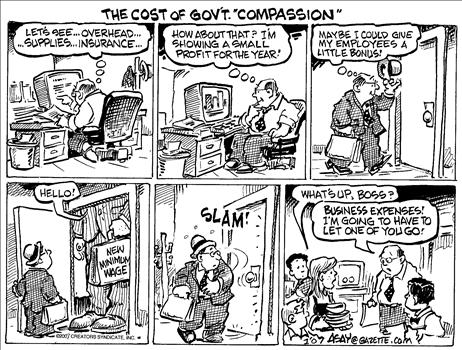
Asset Churning
Q-1:
Subject: oh great oneCan you tell me who is right on this:Let’s say E and K, husband and wife own personal property that they place into service in their new office for their new business.They draw up a bill of sale for these items to the new business – saying, E and K, as husband and wife, sell these items to New Business for $X. Then they write a check from New Business checking account to E and K, husband and wife, and E and K cash said check.E is a “member” of the new business. K is not.Can the personal property qualify as a Section 179 deduction since E and K, husband and wife (apparently for the legal eagles, that is a separate entity even from E or K individually) and K is not a member of the New Business.It’s my understanding that you can’t sell things to yourself and take the Section 179 deduction. HOWEVER, it appears from the arguments that I’ve heard that it really IS NOT selling it to yourself in this case. That E and K are a separate entity from the New Business.with E ONLY being a member of said New Business entity. (E is an attorney and non attorneys are not allowed to be members of a law firm.)What say you, oh great Guru?
A-1:
This doesn't even come close to being in the infamous gray area. That property would definitely not qualify for Section 179 because it is being acquired from a related party and is not an arm's length transaction, regardless of the technical ownership of the business. IRS is very strict with attributed ownership between spouses and your scenario wouldn't pass muster with them or with any experienced tax pro.
You didn't say what kind of business entity (sole proprietorship, corp, LLC, etc) would be buying the equipment; but the answer wouldn't be any different for any kind of entity.
Out of curiosity, is this a real life scenario, a school homework question, or the musings of someone lost in pre new year's celebrations?
Kerry Kerstetter
Q-2:
Real life scenario.1. My Dh is an attorney. Was a partner at a law firm. Struck out on his own. Set up 3 offices, a conference room, entry and bathroom. Many things put into the new office were things we had in another house. We moved those things from the 2nd house to furnish the new offices.Dh argues that "E and K, husband and wife" are a separate legal entity from Ed Law Firm - and that we should be able to sell things to E Law Firm and E Law Firm should be able to deduct as Section 179.I seemed to recall it saying you couldn't.....but had pause with this "husband and wife" entity argument.2. So - what if the furnishings were "owned" by another company owned solely by ME and then the furnishings were sold to E Law Firm?He is not listed with my business and I'm not allowed to be involved in the law firm as ONLY lawyers can be partners or owners of a law firm.I have an incorporation that is currently in place.I swear, it just doesn't seem right that just because we already owned this stuff that we can't get a deduction for it. We WOULD have to purchase stuff for the office and would get the deduction if we bought it from someone else. :shrug:Any suggestions?It is set up as a LLC.....we are pondering the S corp option now (albeit late, I know).Someone said that there are some objections to S corp for lawyers – something about personal services, etc.
A-2:
You really need to be working directly with a professional tax advisor in order to stay out of trouble.
IRS is very strict against allowing inflated deductions based on churning of assets, which is when one supposedly separate entity sells assets to another entity that is related to the one making the "purchase." There is too much opportunity for abuse, such as your inflating the sales price above what the items would sell for to unrelated parties.
Every one of your proposed scenarios would be considered illegal churning because of the close relationship between the entities. Playing with the ownership in your and your husband's name won't make it any less a related party transaction.
I have been in this business for over 30 years, and have earned a reputation of being very aggressive and creative in using the tax laws the best advantage. I wouldn't dare try what you are proposing because it is very obviously churning.
What you will be allowed to do is to start claiming normal depreciation deductions based on the realistic fair market values of the assets at the time they are being converted from personal to business use. Don't try to depreciate the original purchase prices or you will run into IRS problems.
Again, an experienced tax pro can help you with this, as well as going over the many issues involved in deciding which kind of entity would be appropriate for your unique circumstances.
Good luck.
Kerry Kerstetter
Follow-Up:
I KNOW that a sharp tax advisor could help, but we fear the overzealous who can turn us into a bullseye and hate the idea on the other hand of paying what we don't have to.........:shrug:We live in a 6,000 sq foot house. 2,000 sq ft are the 3 offices, conference room and entry. The mortgage interest is about $4K per month. It's my understanding that an S corp would take away the home office deduction. It would help with self employment taxes though. Not sure which way to go. The accountant that I'm working with first suggested S corp, but then I asked her about what deductions I'd be losing and she acted like I was a genius for that occurring to me. That is NOT the type help I need. I don't need any such surprises.

Labels: 179
Recording Reinvested Dividends
Q:
Subject: StocksKerry,I am trying to straighten out a stock account that my dad gave me in 2004.He says with Quicken and Microsoft Money he can enter a dividend payment showing the number of shares and the price paid for them and the entire shares held are updated to that price. Thereby keeping it up to date of the last purchase. Is there a way to do that on Quickbooks?
A:
For reinvested dividends in QB, you need to use the general journal to make entries where you credit the Dividend Income account and debit the asset account for the stock. This will keep a running tally of the total amount you have invested in those shares and accurately reflect your actual cost basis.
If you sell all of the shares at one time, we can just apply the total amount in that account against the sales price to get your gain or loss.
If you only sell part of your holdings, we have to manually take the total amount in the account and divide it by the total number of shares you owned before selling some off to compute the average price per share and then make the appropriate journal entry for the number of shares you sold.
QB isn't as automated as Quicken is in regard to tracking stocks; but it is actually a lot more accurate in keeping the proper documentation of the correct cost basis. Quicken too frequently inflates the book values of stocks to their market values, which is wrong to do before you actually sell the stock. This is one of the many reasons why I prefer QuickBooks over Quicken.
I hope this isn't too confusing. Let me know if you need any more help in understanding this.
Kerry
Follow-Up:
Thanks. I will do my best!
Labels: QB
S Corp Confusion
Q:
Subject: S Corp Advice
Mr. Kerry Kerstetter
I am writing because I need a little bit of advice/consultation. Me and my wife are still working to support ourselves. We have file and received our S Corp with State of Nevada. Also received our FEIN with the IRS. We trade stocks on our spare time. We filed for this S Corp. to cover our rearends for tax implications if whenever we would have any gains (even so small) when we trade. We have invested as stocks to the corp. some of our funds (Approx. $10,000) and bought a company car (paid in full). Probably others like lodging and transportation, lap top to support our business, among others. With all of this investments as company stocks, do we file as a S Corp on 1120 or use the 1040 on out joint return? BTW, we are still very ignorant on these taxes thing. But are willing to learn. We know, we will have to consult and file with our local tax consultant. We just like to make sure that we are on the right path and if would be willing to share some of your wisdom. Also, do have something that what we can claim and what can’t for tax implications? Thank you very much for your time and wisdom.
A:
Setting up an S corp without knowing what that entailed was your first very big mistake. Don't make things any worse by continuing to try to handle tax matters without the assistance of a professional tax advisor. Cruising the web, searching for info is no substitute for the services of an experienced tax professional who can ask you the right questions.
There are far too many options to consider and possible scenarios that can be used to achieve your goals for me to even begin giving you specific advice via this medium.
You will need to work directly with an experienced tax pro who can analyze your unique circumstances. I wish I could help; but I already have too many clients to take care of properly; so we are still trimming back on the difficult clients and are not accepting any new ones at this time.
Unfortunately, we don't have anyone specific to whom we could refer you. I did recently post some names and links for some like-minded tax pros around the country.
If you haven't already done so, you should check out my tips on how to select the right tax preparer for you.
I wish I could be of more assistance; and I wish you the best of luck.
Kerry Kerstetter
Phase-Out of Section 179
Q:
Subject: sec 179I was reading your article and want to be clear with a couple of your answers as I interpret.If I buy a used motorhome I can still write off $112,000 in 2007 if the motorhome costs at least $112,000?If I go over $450,000 in gross receipts ,I will not be able to Take this deduction?thank you
A:
This is a perfect example of why the Tax Game is not for do it yourselfers.
You are seriously misinterpreting the concept behind the phase-out for Section 179. It has nothing to do with a business's gross income. It has everything to do with the dollar amount of qualifying property that is acquired during the tax year in order to limit Sec. 179 to smaller businesses. Businesses that acquire more than $450,000 of qualifying equipment during 2007 will have plenty of normal depreciation deductions, so their Sec 179 will be phased out.
Before you do anything as major as buying a $100,000 plus motor home for your business, you need to work with a professional tax advisor to make sure you understand exactly what the tax ramifications will be, as well as whether a particular ownership strategy (personal, corp, LLC, etc) will make more sense for your unique circumstances.
Good luck.
Kerry Kerstetter
Labels: 179
Fine vs. tax
I was just listening to today’s Rush Limbaugh podcast, and substitute host Roger Hedgecock started the show off with these excellent definitions:
A fine is a tax for doing wrong.
A tax is a fine for doing well.






















